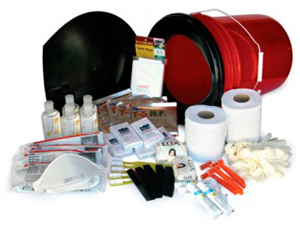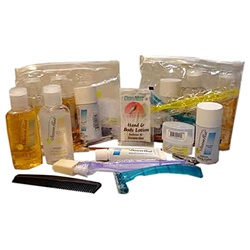Survival Sanitation
The importance of implementing survival sanitation practices no matter how difficult an emergency presents itself is clearly self-evident. Thousands of bacterial, viral and fungal diseases can quickly spread when there is limited or no access to clean water and anti-bacterial soap.
In addition, improper disposal of human and animal wastes will directly contribute to the proliferation of pathogens that cause illnesses ranging from eye infections and scabies to potentially fatal cases of dysentery and cholera.
Hand Washing
Considered the most effective method to prevent the spread of diseases, hand washing with soap several times a day as part of a comprehensive survival sanitation system will control serious health problems such as pneumonia, gastrointestinal illnesses (especially diarrhea) and even Avian influenza, also known as the bird flu.
Maintaining good hygiene and sanitation techniques following a disaster is especially vital to remaining healthy because immune system functioning may be compromised due to fatigue, not getting enough to eat and stress.
Lack of access to adequate and appropriate sanitation and hygiene can be chronic public health challenges contributing to the spread of disease in low- and medium-income countries. This situation can be made worse during environmental disasters and environmental and public health emergencies.
In response to disasters and emergencies, prevention of open defecation and waste containment are critical to reduce the spread of disease.
Although exhibiting a low mortality rate when effective treatments are available, bacterial meningitis is one of many infectious diseases possibly affecting thousands of people following a disaster if survival sanitation systems are not quickly established.
A contagious disease often causing severe complications in people who do recover (particularly hearing loss or brain damage), meningitis symptoms include high fever, vomiting, nausea, delirium and photophobia. Samples of cerebrospinal fluid or blood are taken to confirm the presence of meningitis, with treatment consisting of strong antibiotics.
Keeping hands clean during an emergency helps prevent the spread of germs. If your tap water is not safe to use, wash your hands with soap and water that has been boiled or disinfected. Follow these steps to make sure you wash your hands properly:
- Wet your hands with clean, running water (warm or cold) and apply soap.
- Rub your hands together to make a lather and scrub them well; be sure to scrub the backs of your hands, between your fingers, and under your nails.
- Continue rubbing your hands for at least 20 seconds. Need a timer? Hum the "Happy Birthday" song from beginning to end twice.
- Rinse your hands well under running water.
- Dry your hands using a clean towel or air dry them.
A temporary hand washing station can be created by using a large water jug that contains clean water (for example, boiled or disinfected).
Washing hands with soap and water is the best way to reduce the number of germs on them. If soap and water are not available, use an alcohol-based hand sanitizer that contains at least 60% alcohol. Alcohol-based hand sanitizers can quickly reduce the number of germs on hands in some situations, but sanitizers do not eliminate all types of germs.
Hand sanitizers are not effective when hands are visibly dirty.
Lack of good sanitation and hygiene practices in a disaster scenario may give rise to dysentery, a gastrointestinal illness resulting from parasitic, viral or bacterial infections in contaminating water and/or food. Symptoms of dysentery are fever, cramping, edema and severe diarrhea.
According to the Centers for Disease Control and Prevention in the U.S., the definition of dysentery is any diarrhea containing visible amounts of blood (CDC and Dysentery). Blood occurs in human waste infected with dysentery because the pathogens are damaging intestinal linings and rupturing blood vessels.
Trying to treat dysentery with oral rehydration therapy is difficult. Preventing the disease from spreading is the simplest way to avoid contracting the sickness. Survival sanitation practices include washing and drying hands after using the bathroom, before cooking, before eating food and prior to handling babies can promote a marked reduction in incidences of dysentery. Moreover, washing laundry in extremely hot water will also help eliminate the pathogens responsible for dysentery.
The Wonder Clean Washer
Prepare ahead of time to prevent infectious diseases from spreading following a major disaster by purchasing the Wonder Clean Washer. Although this portable washing machine operates in the same manner as a traditional machine, the Wonder Clean Washer cleans clothes more easily and quickly by combining heat and pressure. When the air inside the washer is heated with hot water, the air attempts to expand. However, because the container is hermetically sealed, pressure starts to increase within the container, forcing soapy water to deeply penetrate clothes and release stains.
The Wonder Clean washer does not need electricity and operates using a hand crank. Simply fill the washer with hot water, add a couple of tablespoons of detergent and crank the tub for about three to five minutes. During an emergency when power is not available, this device will keep washcloths, sheets, bandages, underwear and other materials that are known to spread disease clean and sanitary.
Enzyme 300 Packets
Proper disposal of human wastes is necessary to avoid epidemics of bacterial, parasitic and viral diseases. To deodorize and safely break down urine and fecal matter before disposing, the Enzyme 300 packets contain active enzymes and bacteria in powdered form that reduces any type of organic liquids to solids. In addition, Enzyme 300 opens clogged drains and is a great way to maintain sump pumps and septic tanks.
Finally, one of the main aspects of a survival sanitation plan is trying to keep your body clean in the absence of uncontaminated water or soap. With the ReadyBath Basic Antibacterial Cleansing system, all you need to do is wipe yourself down with one of the ready-to-use, hypoallergenic washcloths containing aloe vera, Allantoin and phospholipids to eliminate germs as well as body odor.
Sanitation and cleanliness will be vital in a long-term survival situation where access to medical care may be impossible. In addition to stocking up on hand sanitizers, bath soap and laundry detergent, learn about those plants which have antibacterial properties or can be used as soap.
More about Survival Sanitation
Return from Survival Sanitation to Survival Medicine and Health







New! Comments
Have your say about what you just read! Leave me a comment in the box below.